States typically impose sales and use tax for the sale, purchase, and use of aircraft. However, the amount of imposed sales and use taxes vary from state to state. Each state enforces specific tax laws that aircraft owners must adhere to. In some cases, states will allow tax exemptions on sales and use taxes if aircraft owners meet specific requirements.
It s important to understand your state’s tax laws and how sales and use taxes work. That understanding can help you avoid paying high taxes and even help you reduce the amount of taxes you owe on an aircraft transaction. Your hangar location, where you purchase your aircraft, how often you use it, and what you intend to use it for are all factors that affect sales and use taxes.
Sales Tax vs. Use Tax
When aircraft sales and purchases occur, states impose taxes on the transactions and use of aircraft within the state. Sales tax applies to the sale and purchase of an aircraft. When an owner sells their aircraft, they must pay a sales tax on the money they earn from the transaction. Depending on state law, someone who obtains an aircraft may have to pay a use tax for operating or simply storing the aircraft within the state.
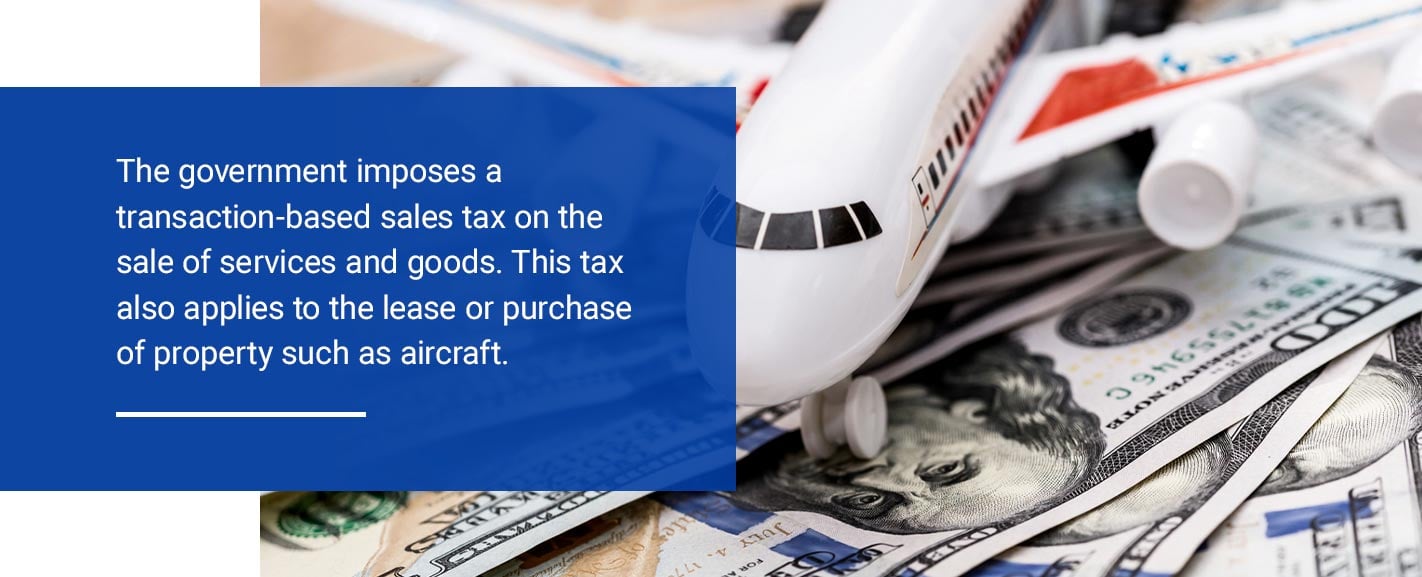
What Is Aircraft Sales Tax?
The government imposes a transaction-based sales tax on the sale of services and goods. Sales tax is a type of consumption tax that the seller is responsible for collecting and delivering to the government. This tax also applies to the lease or purchase of property such as aircraft. Sales tax applies in the state where the lease or sale transaction occurs. A lease transaction can take place in:
- The aircraft’s hangar location.
- The aircraft’s delivery location.
- Any other state with jurisdiction to impose a tax on the aircraft.
What Is Aircraft Use Tax?
As of 2021, 45 states and the District of Columbia have a use tax on property consumption, use, or storage. This tax can apply to any property that was purchased outside the state.
Individual states’ use tax provision structures will determine if a use tax applies. Some states may impose a use tax the first time an aircraft owner uses their aircraft in the state. Some impose it on an aircraft that is present in the state for a certain number of days, while others may only impose a use tax if the owner uses the aircraft within a specific period following the purchase. Some states consider an aircraft owner’s permanent home country a factor, while others consider it irrelevant.
In most situations, aircraft owners must pay use tax based on their hangar location because it serves as the aircraft’s primary base. Since aircraft are mobile and can be used in any state, they can also be subject to use tax in any state with jurisdiction. However, it is uncommon for a state to impose a use tax on a nonresident’s aircraft that only occasionally operates in the state.
Current and prospective aircraft owners should primarily focus on the following tax provision factors:
- The aircraft’s primary base or hangar location
- Whether or not the aircraft owner is a business entity
- The aircraft’s primary place of business
- The owner’s state of residence
- Any state where the owner will frequently operate the aircraft
Personal Property Tax
Sales and use taxes are not the only fees aircraft owners and buyers must consider. It’s also important to be aware of personal property taxes. Some states impose a personal property tax and a registration fee on aircraft transactions. Ensure you address all potential fees and taxes before selling or purchasing an aircraft.
Aircraft Depreciation
It’s also important to consider aircraft depreciation when buying or selling aircraft. Aircraft depreciate over time. When you sell a depreciated aircraft, you will need to pay income tax on the gain you receive. This depreciation recapture is based on the amount the aircraft’s sale price exceeds its adjusted basis. A state will tax this as ordinary income instead of capital gains.
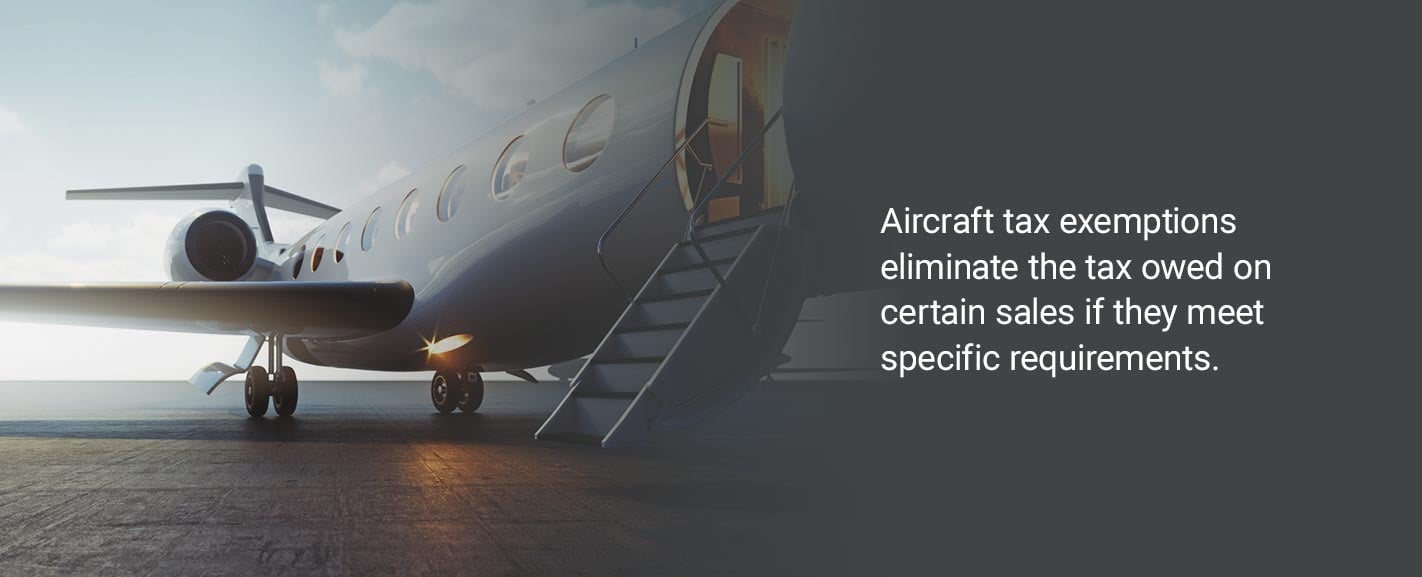
Exemptions
While many states impose significant sales, use, and personal property taxes on aircraft sales, some exemptions exist. Aircraft tax exemptions eliminate the tax owed on certain sales if they meet specific requirements. These exemptions include the fly-away exemption, the isolated or occasional sales exemption, the sale-for-resale exemption, the credit exemption, and the interstate commerce exemption.
Fly-Away Exemption
Many states allow for the fly-away exemption. This exemption applies if the aircraft’s sale occurs while the aircraft is in one state and the new owner moves the aircraft to a different state within a specific period. In this situation, sales and use tax would not apply to the sale. However, the aircraft owner may still have to file paperwork with the taxing authority.
Isolated or Occasional Sales Exemption
Sellers who are not in the business of selling may make transactions called occasional or isolated sales. In some states, an aircraft may be exempt from sales tax if the property owner only makes an isolated sale. However, infrequently-sold high-price items do not qualify for this exemption in many states.
Credit Exemption
Some states allow a trade-in credit that equals the trade-in property’s value to offset the sales tax applied to the purchase price. The transaction must meet two conditions to qualify for the trade-in credit:
- The person purchasing the new property must be the one selling the trade-in property.
- The person acquiring the trade-in property must obtain it with the intention of holding it for resale for ordinary business purposes.
Some states may limit this exemption to the exchange of similar property. With this limitation, a trade-in credit for an aircraft sale would only apply when exchanging one aircraft for another.
Sale-for-Resale Exemption
The sale-for-resale exemption is the most significant in aircraft sales, often occurring when a licensed dealer purchases an aircraft for their inventory. Since the dealer purchases the aircraft with the intent to sell it in a future taxable transaction, the state will not collect a sales or use tax on the purchase.
Sale-for-Resale Including Leasing Exemption
The sale-for-resale exemption can also apply to leasing situations and is based on two notions — that sales taxes typically apply to retail sales rather than wholesale sales and that leases typically qualify as taxable sales. In some states, this exemption allows a company or person to purchase an aircraft tax-free by establishing a separate business entity as a leasing-and-holding company.
The sale-for-resale leasing exemption only applies under certain conditions:
- The buyer must purchase the aircraft solely to hold and lease it to other parties: In this situation, the buyer is responsible for paying sales tax on the lease payments, resulting in a tax deferral. The total sales tax on the aircraft would depend on how many years the buyer owns it, allowing them to make sales tax payments over several years and avoid paying an entire up-front sum.
- The leasing-and-holding company must lease an aircraft without a crew, aircraft management, or pilot services: The person or company that the owner leases the aircraft to is responsible for hiring employees, working with a separate management company or setting up their own pilot company.
- The aircraft owner must not operate the aircraft, and the aircraft’s sole purpose must be for leasing: Ignoring this rule can result in an imposed sales tax on the original purchase in addition to penalties.
The sale-for-resale leasing exemption differs between states in regards to the lessee. Some states require that an aircraft owner leases the aircraft to only one affiliate and others require an exclusive lease to a single entity.
While some states implement the sale-for-resale exemption, others have rules in place that cancel it out:
- Operating vs. capital leases: Some states attempt to establish a distinction between operating leases and capital leases. In these cases, a state will view a lease with a purchase option of a nominal sum as equal to a sale and tax the original purchase price. Some states will even treat leases as a sale if the leases exceed a percentage of the aircraft’s value.
- Taxing on commencement: Some states charge a lessor or lessee tax on the total sum of an aircraft’s lease payments due as of the commencement date, resulting in a higher sales tax than the tax on a standard sale.
- No lease taxes: Some states will not tax any type of lease, preventing aircraft owners from using the sale-for-resale exemption. This exemption requires a minimum of two taxable transactions — the purchase and the release. If the lease is not taxable, the state will not consider the first transaction to be a purchase for resale and will require tax on the aircraft’s original purchase price.
Interstate Commerce Exemption
While the interstate commerce exemption varies from state to state, it shares some similarities with the sale-for-resale exemption. The interstate commerce exemption is based on the recognition that aircraft providing transportation services to the public should be tax-exempt. In these cases, the aircraft’s buyer is considered a transportation services vendor, making them exempt from taxation or only eligible under a different tax arrangement.
The Federal Aviation Administration grants the Part 135 certificate to companies if they meet a specific section of Federal Aviation Regulations (FARs). Some states offer the interstate commerce exemption to Part 135 operators, while others limit it to scheduled carriers. The Part 135 certificate allows companies to operate as non-scheduled air charter carriers, and some states deny the interstate commerce exemption to on-demand jet carriers.
States also base eligibility for the interstate commerce exemption on different factors. Some states focus on an aircraft’s end user, while others focus on the use of the aircraft. Other states allow the exemption only if the aircraft’s purchaser or lessee is a certified air carrier.
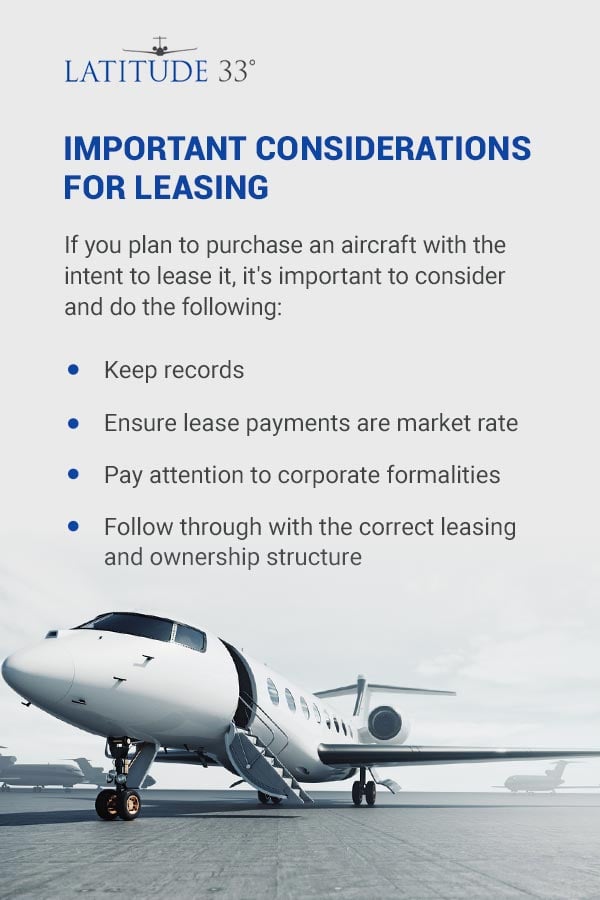
Important Considerations for Leasing
If you plan to purchase an aircraft with the intent to lease it, it’s important to consider and do the following:
- Keep records: Keeping records of everything will ensure you have everything you need if the state performs a tax audit. Many states require taxpayers to maintain accurate records and books, and many tax authorities require thorough records to support any requests for exemptions. An aircraft owner must present bank statements and invoices to back up each entry. It’s also essential to keep records of any third-party transactions.
- Ensure lease payments are market rate: If a lease rate falls under the market rate, a tax authority may impose a higher one. Ensuring you set your lease payments at the market rate will prevent tax authorities from imposing their own lease rate. Some states require aircraft owners to charge a lease rate equal to the sales or use tax they would have paid if the exemption was not applied.
- Pay attention to corporate formalities: Corporate formalities are the rules and guidelines that allow a corporation to meet its operational requirements and retain the benefits of corporate protections. Following these formalities ensures that the state’s tax authority considers the entity a legitimate business.
- Follow through with the correct leasing and ownership structure: Following through with the correct leasing and ownership structure ensures that the state’s tax authority will recognize the purchase and lease as a legitimate transaction. Execute your written lease when you purchase the aircraft to ensure you can claim the exemption within the state’s time limit.
Looking to Sell or Purchase an Aircraft?
Selling or purchasing aircraft requires extensive knowledge about an aircraft’s value and potential taxes. The taxes you will owe on an aircraft transaction will depend on where you complete the transaction, your hangar location, and where you use the aircraft. Some states allow for tax exemptions if you meet certain requirements, so it’s important to understand state tax laws.
Adhering to a state’s tax exemption requirements can help reduce the amount of taxes you owe on an aircraft transaction. As an aircraft sales and acquisitions company, Latitude 33 Aviation conducts market research to help buyers purchase aircraft that meet their specific criteria. Our experienced acquisition experts can help you protect your multi-million dollar sale or purchase, so your investment is safe.
With the help of Latitude 33 Aviation, you can make informed decisions, and avoid costly pitfalls when buying a private jet. Contact Latitude 33 Aviation to learn more about how we can help you make informed financial decisions as you sell or purchase a quality aircraft.
*This material has been prepared for informational purposes only, and is not intended to provide, and should not be relied on for, tax, legal or accounting advice. You should consult your own tax, legal and accounting advisors before engaging in any transaction.


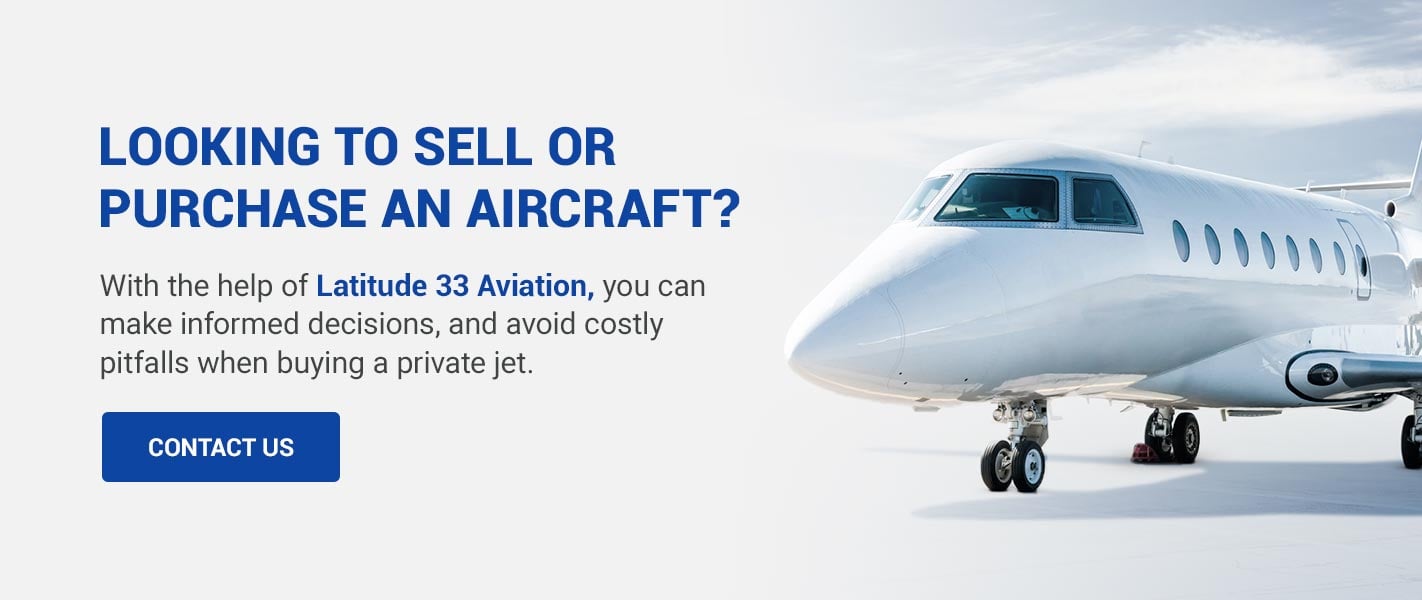
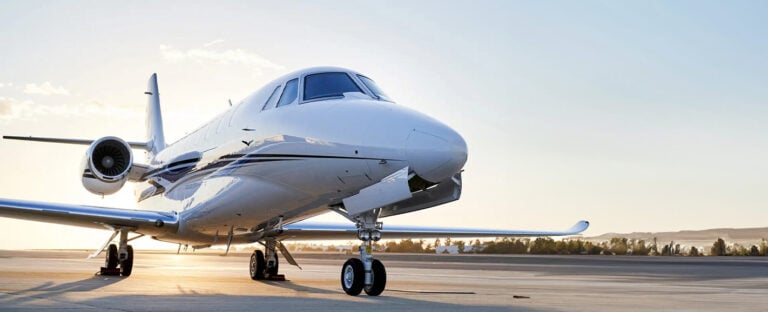


Comments are closed.